Where is the New Zealand economy headed?
Over the past few years food producers in New Zealand have been subjected to a relentless smear campaign by lobby groups, media and the government. The general public has been brainwashed to think that our food production needs radical change. This Blame Game has focused on GHG emissions, water quality, and biodiversity. It’s time to put the record straight.
Over half of this country is in trees, mountains, natural cover. ALL farming is 39% of total land area. A projection of current trends is shown in the graph on page 3. How is New Zealand going to earn a high standard of living? What happened to “the Switzerland of the Pacific”? Is Auckland really the powerhouse of the economy? How would Auckland get on as a separate nation like Singapore?
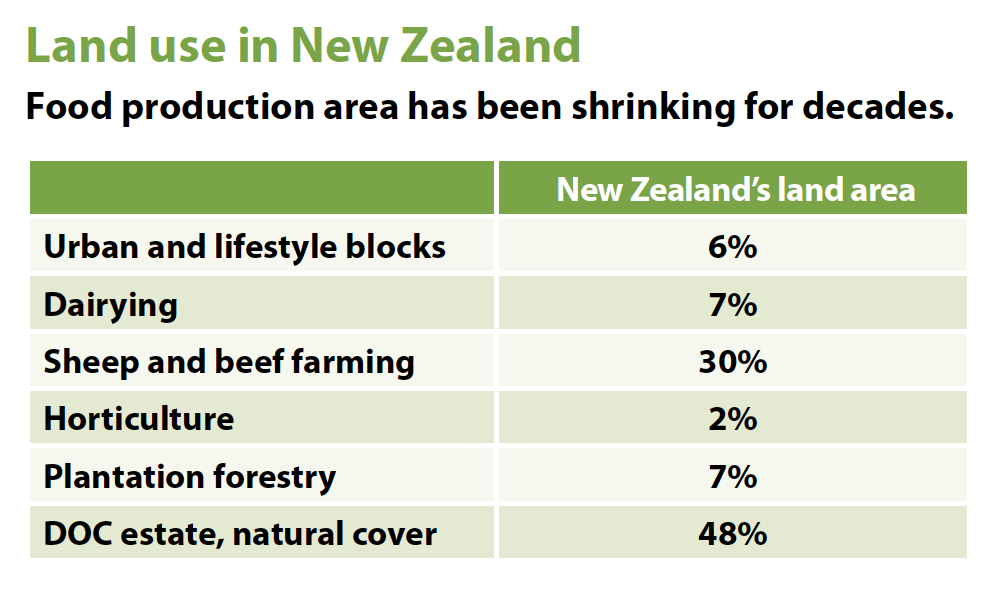
Contradictions, double standards, symbolic gestures
“The Environment” has become a religion for some people. Lobby groups get their funding by creating anxiety. The Green Party gets most of its votes from wealthy electorates, so the rich, who tend to have the most GHG emissions from driving and flying, can appease their consciences.
New Zealand has clean water
Google lists New Zealand as one of seven nations with the cleanest water in the world. What’s the prize for being cleaner than that? There is an annual swimming race in the Waikato river through Hamilton, though the race stops short of the sewer outlet. Auckland beaches are swimmable some of the time. How many rivers in New Zealand are not swimmable? There are problems with E. coli sometimes, but that is usually because of birds.
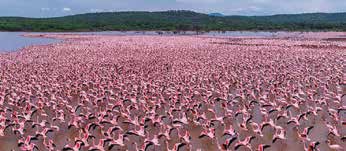
Ten thousand flamingos... a beautiful sight but, you wouldn't want to swim there.
Double standards apply: cities escape severe fines for breaches of sewage and stormwater regulations, but food producers get hammered.

Rivers aren’t fenced in Africa
Another contradiction in the official line is “that sediment is bad”.
But where did human civilisations set up? Today there is huge angst in Vietnam about the Chinese building more dams on the headwaters of the Mekong river, because the annual floods bring new soil to farmers in Vietnam, renewed fertility.
Nutrient: there is huge pressure to keep animals out of waterways here, yet the same people enjoy watching large animals in Africa playing in rivers and lakes. Three tonne hippos live in the water. Strangely enough, Africa has 22 times the number of freshwater fish species than New Zealand, 1,279 versus 58. Nutrient feeds life. Other countries fly fertiliser onto lakes to feed plant life to grow bigger fish.
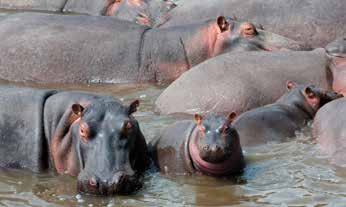
- Do “greenies” understand the big picture? Big animals live in African rivers and there are 1279 species of freshwater fish, compared to 58 in New Zealand’s barren rivers, where the water is too clean.
- Native fish in New Zealand thrive in unfenced pools in well developed farmland, where “piranha like” brown trout are not present, and more nutrients are in the water (PhD research paper).
- And Australian police have detained more than two hundred people who have deliberately lit fires… but global warming gets blamed.
Biodiversity
New Zealand always had poor biodiversity

At their peak, livestock were grazed over 60% of New Zealand’s land area. That’s down to 37% now. Large areas have reverted to scrub and native bush, and many hectares have been retired by DOC or donated by food producers as QE2 covenants. Some species of native birds have grown in numbers, and some species have self introduced.
Why taxing methane is theft
-
It is unjust. It fails to recognise the natural carbon cycle.
-
It is unscientific. The method of assessing the levels of methane from ruminants is flawed.
-
It is unfair. The assumptions are based on figures that are officially + or – 50%.
-
It is unlawful. The Paris Agreement said to exclude food production.
-
It is economic madness. Why leg-rope the sector leading the recovery?
The Paris Accord has a goal of stabilising GHG emissions in a way that does not reduce food production. New Zealand agriculture has complied with those requirements since 1990. New Zealand is squandering its land resource, with no planning around food security for a population which is increasing by two percent per year.
Reinventing New Zealand?
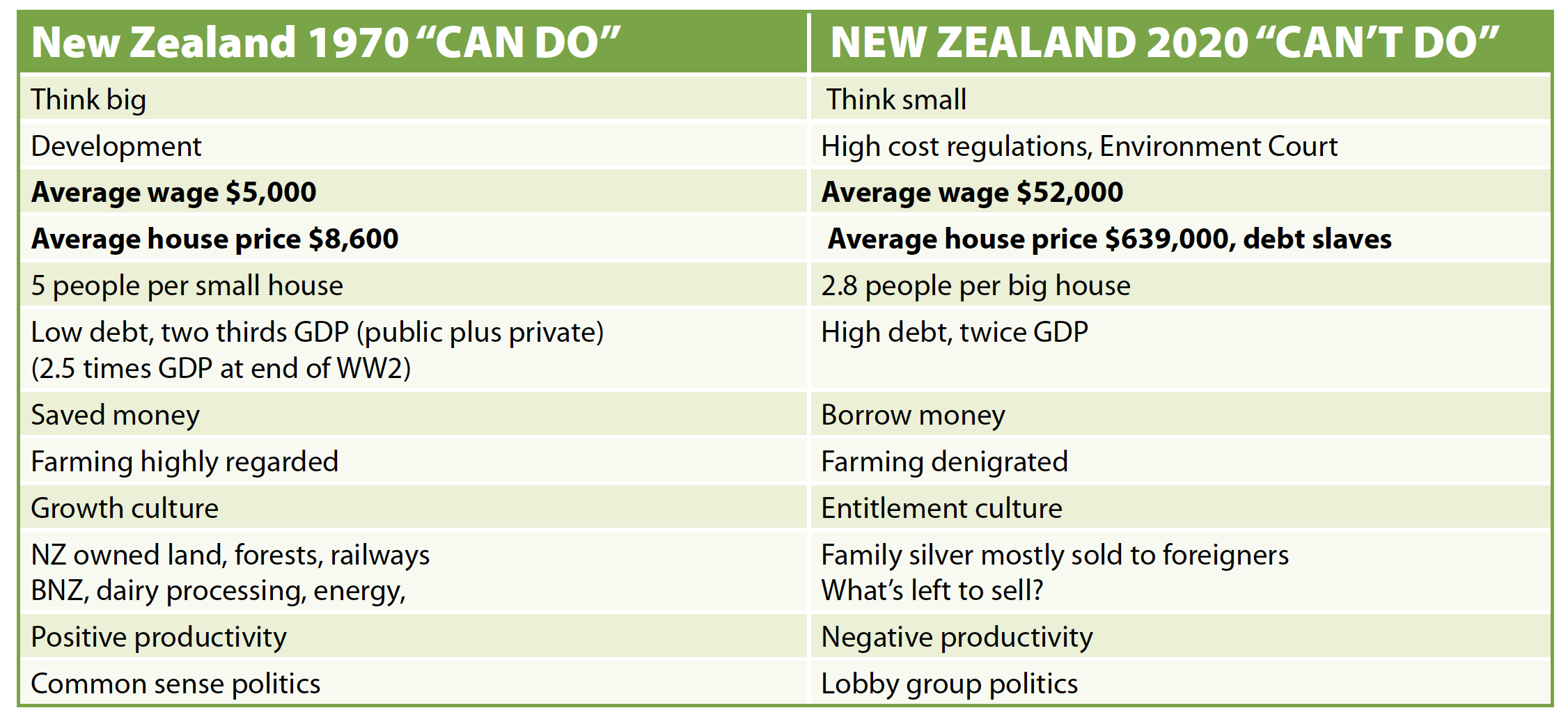
With the odd exception, New Zealand is now led by people who have never been hungry, never fought in a war, and never run a business. Will we have the discipline, as our forefathers did, to rebuild at an affordable cost?
Reality check
The current government is engaged in granting an extra holiday, and five more days of sick leave. “Let’s stop moving”… Meanwhile, new immigrants are fast taking over ownership of the best cashflow businesses, because they work hard, and avoid employment and overtime costs by working within the family. Politicians pander to the bottom 20% of society while imposing more and more cost on businesses. How is New Zealand going to compete on the world stage?
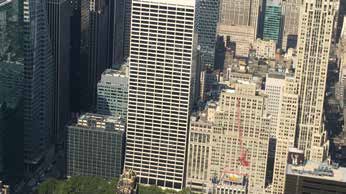
Just like animal feedlots, the feed is trucked in and the waste piped out. New Zealand earns its living from the land, not from the cities.
Written by Derek Daniell, farmer in the Wairarapa. “It’s a huge worry to witness the kneejerk, political response to the Paris Accord… blame the animals? There is so much muddled thinking for the short term, not for a sustainable New Zealand.”
Get a copy of this document
Feel free to download and share this document.
NZ’s productivity crisis
- The internal cost structure to build houses and roads is well above what our export sector can afford.
- Endless environmental reports. What % of NZ’s 94,000km of roads are an “environmental disaster”?
- 15 years to action an irrigation scheme while costs double and triple.
- Every extra bureaucrat has to justify his/her existence. The regulators are breeding.
- Symbolic gesture: banning exploration for oil and gas will lead to more imported energy.
- Economy held together by productivity increase in the agricultural sector.
- You will pay indirectly for the carbon credits paid to rich people who plant trees. One estimate is $7,000 per household.
Solutions
- The planet is overstocked with people, the root of all our problems? Cap New Zealand’s population at 5 million.
- New Zealand’s Paris Accord targets: remove ruminant emissions. Remove the government guarantee of carbon credit payments for planting trees.
- Continue oil and gas exploration, target self- sufficiency.
- Impose a significant entry charge on tourists. Increase foreign visitor charges for all tax payer created facilities, e.g. Aotearoa trail. It works in Bhutan.
- New Zealand agriculture is more regenerative of soil fertility than most countries in the world. Don’t handicap food production with stupid regulations.
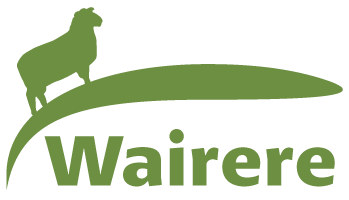
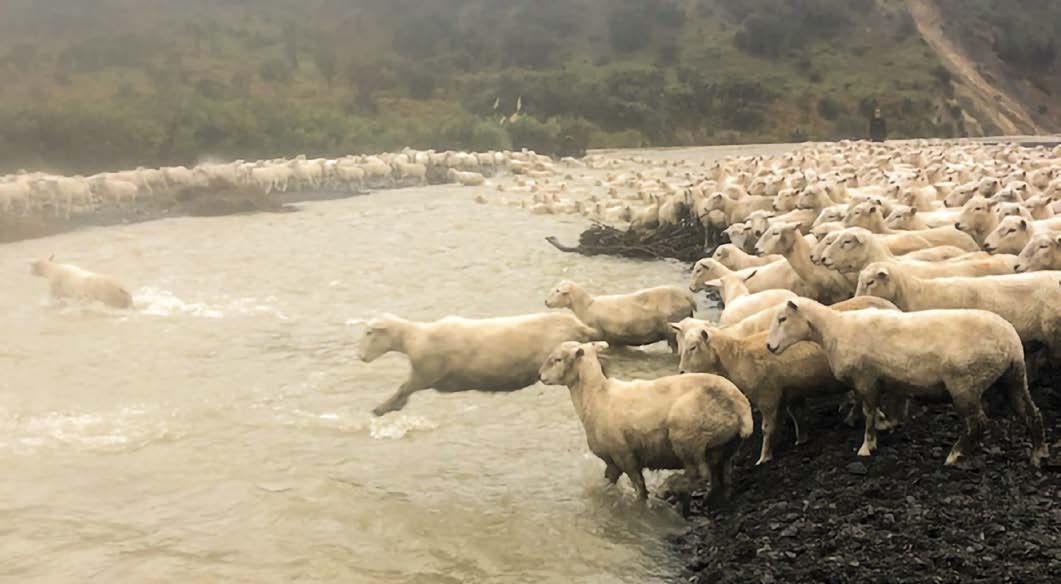
Awesome article. Thank you so much for taking the time to write and publish it. You made me day getting this the mail today. I will share as far as I can.
Good commonsense information that our politicians need to heed
Well written, my wife, kids and I have been wondering how to put all this together for some time, congratulations and well done for an article that covers the conversations we have with urban and rural people alike, everyone is sick of regulation, every business lives in fear of what they havnt done as opposed to what they have done. Government puts up minimum wage, puts up cost of regulation, drives up inflation, makes everything more expensive, and so it begins. Our young are taught not to go on farms, even farm kids as “it is very dangerous”, as we know farm kids are more likely to be responsible, look after the environment, care for animals, help the community, and know what work is, what is the cost of not teaching our young ones these responsibilities. Our farmers are so hogtied through regulation you can’t teach tractor skills, or motorbike skills or chainsaw skills, ” what if something happens” so they take our hard earned cash and set up Dairy NZ to put a diagram of when to inseminate a cow, I thought the farmer should teach that, not some guy behind the editing desk in Auckland. The world is slowly losing its compass, I agree totally with your information, let’s hope someone that can do something sees it, thanks again for a good read, cheers Terry and family
It feels to me that everyday farmers are starting to be targeted and blamed more and more. It’s almost as if the urban population are led to believe that farmers are the enemy and can do no right. But in reality we should be being praised as we our the backbone of this country, and if it were not for farmers this country would of been in a greater and more severe economic crisis than we are already in. So I just hope that sooner rather than later the majority of NZ open their eyes and see that farmers actually care about the environment and climate change, and are willing to adapt. Rather than just being criticized and hammered with new taxes and regulations.
To whom it may concern
We are an NZ based environmental charity that was pleased to hear about your comments on overpopulation.
You may be interested in reading our petition
Hi good to here some positive thoughts sick of being blamed Our lovely ruminants don’t make carbon ! Just a cycle . Need credits for our grass and trees I be farming well neutral People need to wake up keep up good work Cheers From broken down old Southland Farmer rob miller
When the Sink or Swim pamphlet arrived in our box we were delighted that someone had expressed so many of our misgivings about the way we are being governed . . . not just agriculturally but in every govt department. Our own distress has been largely caused by DOC and their management of well over half the country when you take into consideration the increasing area of private land being given up to DOC-style enterprises which devour such a mountain of public money.
There is no hope of real change through politics as they stand today. There are no real alternatives of offer at the coming election because it is the system which needs to change not just the policies.
We wait in hope for some gigantic upheaval which might force real change.
Thank you Derek. You have expressed a very real situation from a farmers’ point of view, one with which we can all sympathise.
Thank you Derek for writing and putting out there SINK OR SWIM .
we will be sharing your very well written article .
Excellent article after reading the WEF /UN idea of removing all animal products by 2025 for some lab concocted abomination . It’s not the world any of us or our forbears planned for the future . I could weep for the grandchildren of tommorrow if we continue on this highfalutin path
So good to see someone knows what they are talking about. Its time that the people who are slamming our farmers walked for a week or two in there shoes or boots. As they seem to think all they are doing in walking around in mud.
Sink or Swim came in the Farmers Weekly. Farming people already know this stuff is true. Share with your urban friends.
Thank you for substantiating concerns about where we’re heading – down a slippery slope.
The farmers need recognition for their tremendous contribution to our nation’s economy, not this nonsense being promoted and perpetuated by groups, political included, of veganism, carbon emissions etc etc. It’s frightening their headstrong and sinister push to limit farmers and us, what we can do and can’t do with our farm or plot of land.
Thank you for your post.
Thanks Derek for simply telling the truth about what is happening to this country. It is incumbent on all of us who are able to influence change to support this message before it is too late.
John would have been so proud.
Clive Bibby.
Thankyou Derek for writing this excellent article & more so substantiating your concerns. I have shared this article & left a copy in the smoko room at my place of work & urged everyone to have a read.
Education is what our urban communities need.
The first paragraph of the solutions is so true. The root of all the problems are the amount of humans breeding into the planet. There is no other mammal that could get away with this type of unchecked growth. We need to take ownership of this fact and do something about it. Blaming climate change etc etc on farming and livestock is simply a copout.
Excellent article Derek. I am very keen to distribute this paper among as many outlets as I can think of but I have one comment to make which I believe would improve it. I would like to see references included as to the source of your data gathering such as in ‘land use in NZ’, the data included in ‘NZ has clean water’ and your biodiversity column etc. I think this would really improve the credibility of the article especially when it is read by urban dwellers. Farmers already know these truths, but urban dwellers need education in a hurry.
excellent informative newsletter – i am a farmer and this NEEDS to go viral for the whole of nz to read before voting decisions are made so they know the truth and the big picture of where our future is heading
Horrible truth
– People with an agenda use lobbyists / media to gain support.
– Media / lobbyists drive public opinion
– Public opinion drives politics
– Politics drives policy
– Policy drives law.
o Truth, science, fact and reality is often a casualty.
Horrible truth
– People act on what they are told.
– What they are told often lacks relativity.
– People were told, “The SARS epidemic is a killer!”
o Airport closed, Hotels closed, travel stopped. Panic, panic.
– 8,100 people died of SARS, in TOTAL.
– 8,300 people die a week of malaria, no news on this.
Almost all of us have a deep desire to do the right thing, most of us realise that this planet is our home and we need to look after it. The question is….
How can we make informed and sensible decisions about the betterment of our planet and society when there is agenda driven distortion clouding the judgement of well intentioned and good hearted people?
But remember
Evil spreads when good people do nothing.
Brilliant! I will share as widely as I can. We must fight back.
Great read Derek, thank you.
Unfortunately without references it’s hard to see your efforts to unveil the truth being more than a ‘great read’ for those that already agree with you.
References would give your work credibility and the ability to influence critical thinkers.
Please consider taking it to the next level. This information needs to be shared.
Colin Jackson
While better late than never – this comment – I’m afraid the horse has well and truly bolted. Labour will not accede to extreme Green demands but it has plenty of its own. Extra holidays and sick leave is just the start. Three strikes, 90 day trials, an increase in the minimum wage to $25 an hour (that’s $50,000 a year to fry chips) are all in the pipeline with lots more to follow over the next two years. Forget democracy, there’ll be a Maori Parliament and probably a Maori co-Prime Minister before too long. Taxes will have to go up. The productive sector, incl farming, will be punished. Let’s keep moving (left). Remember all this in three years.
Enjoyed the brochure in FW Derek. Good effort.
However.
There are a few ‘conclusions’ you draw that we just can’t agree with.
In the meantime, we actively promote a Resource Based Economy. This is a scientific method of running our society as opposed to using money and business as our main drivers.
The end results are what we all aspire to ,but we feel that capitalism has so evidently failed now that there really is nothing left to justify continuing with it.
We see all the symptoms as inevitable failures in a system based upon exploitation and competition.
I particularly liked your reference to house sizes, numbers of occupants and cost. All sadly inevitable results of capitalism.
What we advocate at http://www.moneyfreeparty.org.nz is a system based upon everything being free and all work voluntary. No money, trade, barter or currency.
I was intrigued by your publication. It would be so good to have a chat sometime.
Cheers
Richard
021 159 1590
Well done Derek..
For taking the to produce this article…
AN put to print the true facts… About our country
Dairy farmer, taranaki..
Hi Derek,
A friend told me about your article prior to the election, but sadly circumstances have meant I have only read it tonight.
As a Jaffa but someone who has lived in the rural environment for large parts of my life I 100% agree with your article and thank you for having the courage to compile it.
Sadly the present government lead by Comrade Ardern despite Covid 19 do not have either the ability or the brains to realise that Primary Industries are basically all that are keeping this country above water. For proof of this just look at the Minister for Agriculture and Biosecurity who is only ranked number 10 in cabinet, He should be at least at number 3. Also look at her reappointment of David Parker as the Minister of the Environment, this person is hell bent on destroying farming as we know it.
I think the next 3 years will bring only pain to the rural sector.
Keep up the good work.
Cheers
Wayne
Why are you comparing NZ rivers with African rivers? Completely different ecosystems. Do you think the organisms living in NZ rivers can suddenly adapt to cope with large mammals? That’s not how evolution works. Cows do not belong in NZ’s rivers.
A CLIMATE CHANGE FOLKTALE from Nick Grabartte
Danny Kaye sang, “The King is in the altogether…” Hans Christian Anderson wrote “The Emperor’s New Clothes” based on stories from previous centuries with the same message. It could be applied to our Climate Change actions.
A city Emperor is fond of clothes, and conmen claim to weave a suit for him that will be invisible to stupid people so that he could identify them from wise people. The Emperor relied on his advisers with their evidence about the suit and his invisibility, and the Emperor wore it in public. Everyone was troubled by what they cannot see, and about their beliefs. But they all claimed they can see the suit. A child broke everyone’s delusions by calling out, “The Emperor has no clothes!”
A problem for the people. Should they tell the truth of not being able to see the suit, or accept their own beliefs, or lie to save themselves from ridicule? Was this self-deception, or denying or rationalising conflicting evidence and logical arguments of what is acceptable in their social group. Some people conform simply because they believe their group’s ability to state what is true over their own perspective. Others may conform in order to be liked or accepted by their group.
It could be argued that although we accept a changing climate with significant negative effects to us, NZ can do little to change that because we are so small and inconsequential in global terms. The oft-quoted fact that, because our emissions per person are high we must take action, will not stop forecasted global destruction.
Our largely agricultural methane emissions, repeatedly misquoted as being half our problem, are miniscule compared with that from wetlands, lakes and ponds, coal, oil, gas and biomass production, tundra melt and wild herbivores. Our CO2 emissions, largely from transport and energy sectors, are miniscule compared with burgeoning global transport emissions, yet we subsidise more tourist travel. Our total CO2 emissions are less than half volcanic emissions.
So why do we have our suit of controls? Partly because we have a human responsibility to protect ourselves. Partly to be seen to be doing that, such as the recent threat that we could drop out of the top 30 industrialised address if we don’t. Partly in the hope of international rewards. Partly because the suit is being woven by lobby groups with their own agendas.
Examples have been the recent Ecological Society cry for farmers to reduce farm methane with fewer cows, and by Greenpeace to rid us of cows. Yet the NZ milk production carbon footprint is 0.74 compared with say Ireland 1.18 and USA 1.09, who would increase production to fill the gap left by our reduction. Global carbon would increase. These lobby groups influence the population particularly, because mass and social media carry their message without a reality check.
Is this another version of “The Emperor’s New Clothes” and the moral dilemma we have? Maybe advice and presented evidence needs a child to shout out about.
I really agree with this article. We can not ignore that New Zealand’s Agricultural land generates more income than our cities. It doesn’t make sense to heavily tax New Zealand’s food production and primary source of income. Because without our agriculture we simply can not feed New Zealand’s growing population. I believe there should be some taxes on Agricultural production with water, as water is a limiting resource taken for granted. However, taxing farmers on methane with little knowledge of how it is measured and its effects is insane. I just don’t see another plan for how we are going to feed New Zealand if Agriculture keeps declining
Does the statistic of 30% of New Zealand’s land area being used for sheep and beef farming take into account the parts of these farms that are non-productive land areas located on the farms? Many sheep and beef farms have large blocks of native bush that is not able to be used for grazing as it doesn’t grow any pasture. If this has not been taken into account, is this 30% statistic an accurate figure to use? Or does the writer need to be more specific on whether it is effective or un-effective land being included in this information?
I believe it is not right to compare animals being in waterways between Africa and New Zealand. Hippos are native to sub-Saharan Africa. However, livestock farmed in New Zealand are not native to New Zealand. I believe the main difference is that hippos are native to these waterways and always have been, whereas livestock in New Zealand were introduced here to produce a product. This gives New Zealand farmers more of an obligation to restrict the damage done to kiwi waterways via livestock, than people from Africa do in regards to hippos.
Derek says that most of the green parties votes are from wealthy electorates, as they feel as though they need to vote for them essentially out of guilt for having high GHG emissions. If this is the case, is the green party being supported by those people who are damaging the environment the most, which is contradictory to what they are trying to achieve as a party? I wonder if the votes of these wealthy electorates were excluded from the green party, if they would fall in popularity, and their proposed policies to increase the wellbeing of the environment be forgotten.
Derek says in his solutions to target self – sufficiency as a country. NZ exports a lot of the meat produced here, and if we were to become self – sufficient then New Zealander’s diets would have a drastic increase in meat. This could potentially cause for more of an uproar from those groups who do not support the meat sector within New Zealand.
The tourism sector benefits the most in Africa from animals damaging their waterways. The agricultural sector benefits the most in New Zealand from livestock damaging our waterways. New Zealand farmers receive criticism as our livestock were introduced here to make money from them. Africa’s safari’s have made a sector around show casing the animals that were already naturally there. I believe this is the difference between the two countries and makes it an interesting one to compare the two.
How will the steady decline of food production area in New Zealand impact the country’s economy given it is heavily influenced by exports produced in these areas? Are there other stable industries that can replace the loss of agricultural and horticultural exports?
With the populations growing concern over climate change and the environment, will we see a decline in farmers in New Zealand as they struggle to keep up with constantly changing environmental regulations which are heavily targeted towards agriculture rather than making adjustments in industrial procedures?
Why is methane taxing still being considered to reduce greenhouse gas emissions when the Paris Agreement clearly does not want to reduce food production through its movement? Is it fair to focus on agriculture to reduce greenhouse gas emissions?
With the productivity crisis going on in New Zealand, does there need to be a government focus on protecting production area to help maintain an economy strongly held together by a production increase throughout agriculture?
Capping the population at 5 million will create large controversy in society which is heavily impacted by a strong belief around freedom of choice currently. Putting a cap on the population will cause large social unrest and lead to an overall unhappy population and a lack of confidence and trust in the nations leaders.
Why is New Zealand’s method towards handling the Paris Agreement focused on removing ruminant emissions? With an economy that heavily relies on the products that these ruminants create for export, the focus should be spread across industries. Punishing New Zealand’s large export markets, such as dairy, may play a role in helping the environment but will have a significant impact on the economy.
Edit private note